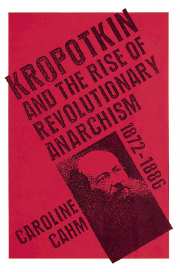Book contents
- Frontmatter
- Contents
- Preface
- Acknowledgements
- Introduction
- Part I Kropotkin and the development of the theory of anarchist communism
- Part II Kropotkin and the development of anarchist ideas of revolutionary action by individuals and small groups (1872–1886)
- 3 Revolutionary action and the emergent anarchist movement of the seventies
- 4 Propaganda by deed: the development of the idea
- 5 Kropotkin and propaganda by deed
- 6 Kropotkin and acts of revolt
- 7 The Congress of London 1881 and ‘The Spirit of Revolt’
- 8 The trial of Lyon 1883 and response to persecution
- Part III Kropotkin and the development of anarchist views of collective revolutionary action (1872–1886)
- Conclusion
- Notes
- Bibliography
- Index
6 - Kropotkin and acts of revolt
Published online by Cambridge University Press: 14 September 2009
- Frontmatter
- Contents
- Preface
- Acknowledgements
- Introduction
- Part I Kropotkin and the development of the theory of anarchist communism
- Part II Kropotkin and the development of anarchist ideas of revolutionary action by individuals and small groups (1872–1886)
- 3 Revolutionary action and the emergent anarchist movement of the seventies
- 4 Propaganda by deed: the development of the idea
- 5 Kropotkin and propaganda by deed
- 6 Kropotkin and acts of revolt
- 7 The Congress of London 1881 and ‘The Spirit of Revolt’
- 8 The trial of Lyon 1883 and response to persecution
- Part III Kropotkin and the development of anarchist views of collective revolutionary action (1872–1886)
- Conclusion
- Notes
- Bibliography
- Index
Summary
For Kropotkin and his comrades in the Jura Federation the outlook at the beginning of 1879 was particularly grim. Brousse had been arrested and L'Avant-Garde, the only remaining anarchist paper, suppressed. In a letter to Robin in April Kropotkin complained that the revival of popular interest in the movement after the Congress of Fribourg had faded in the face of persecution and economic depression. Moreover, already demoralised by the decline of grassroots support and the constant threat of unemployment, even militants like Spichiger, Pindy and Schwitzguébel had been intimidated into withdrawing from active involvement in the movement. The Swiss had not responded to Kropotkin's plea for collective action in the commune, and the violent acts by individuals with which anarchists in Switzerland as well as in Italy and Spain had sympathised, had endangered the very existence of the Anarchist International.
Depressed though he was by this situation, Kropotkin was convinced that events were moving inexorably towards revolution – that increasing government repression only revealed the bankruptcy of capitalist states and the inevitability of their collapse in the face of rising popular discontent. And believing that it was hope, not despair, which makes successful revolutions, his immediate concern was to communicate his views to the people so as to sustain and inspire them in the face of oppression. He therefore proposed the setting up of a paper to replace the Bulletin and L'Avant-Garde. But the response of the sections in the Jura Federation was negative. Only Brousse supported the idea – all the others predicted certain failure.
- Type
- Chapter
- Information
- KropotkinAnd the Rise of Revolutionary Anarchism, 1872-1886, pp. 116 - 151Publisher: Cambridge University PressPrint publication year: 1989



